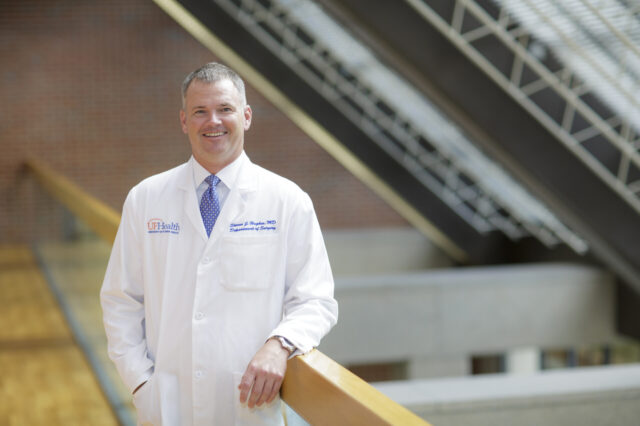Grant will help researchers create a better test for pancreatic cancer

Up to one-third of pancreatic cancer cases go undiagnosed through standard means of testing. A University of Florida Health surgeon hopes a new project and alternative testing method can more accurately detect the presence of the disease — reducing the number of false negatives to as low as one in 20.
Steven J. Hughes, M.D., chief of the division of general surgery in the UF College of Medicine, and his colleagues believe that measuring levels of protein signals called cytokines and chemokines that are secreted by scar tissue surrounding a pancreatic cancer tumor might lead to a less invasive, more sensitive way to test for the disease. Hughes has received a two-year, $300,000 translational research grant from the Pancreatic Cancer Action Network, or PanCAN.
The current standard of care is a procedure performed under general anesthesia called an endoscopic ultrasound-guided fine-needle biopsy. This test, however, can miss the diagnosis of cancer in up 32 percent of cases of operable disease in patients where the tumor is confined to the pancreas, Hughes said. The research team proposes that testing for those proteins secreted by scar tissue might decrease the risk of these “false negatives” to as little as 5 percent.
“The pancreas is difficult to biopsy because you can’t take a large chunk of tissue,” Hughes said. “The organ is located in the back of the abdomen, surrounded by vital structures, and it produces digestive enzymes that can leak — even from a needle stick — causing injury to adjacent tissues.”
This comes with significant consequences to these patients, including repeat attempts at biopsy, ineligibility for clinical trials and having to decide whether to proceed with surgery without proof they have cancer, he noted.
About 15 percent of patients with the most common form of pancreatic cancer, adenocarcinoma, are candidates for surgery. Chemotherapy or other medications are used in patients not eligible for surgery. Clinical trials, however, are the preferred treatment option.
“If successful, this research offers a profound advancement from a pancreatic cancer survivor and family perspective. It offers a more accurate way to obtain a definitive diagnosis using the same technologies that are already standardized in the clinic, ultimately saving time and money, and opening more doors to new treatments through clinical trials,” Hughes said.
This year, PanCAN estimates that more than 53,000 people in the United States will be diagnosed with pancreatic cancer, and approximately 43,000 will die from the disease. It is currently the third-leading cause of cancer-related deaths, and it is expected to rise to the second around 2020.
PanCAN, in collaboration with donors, awarded 17 grants through a competitive peer-reviewed Research Grants Program to 21 researchers at 12 institutions this year, investing an estimated $4.9 million in vital pancreatic cancer research across the country.
“Our competitive Research Grants Program and the brilliant scientists we continue to support are critical to moving us closer to our goal of doubling survival rates by 2020,” said Lynn Matrisian, Ph.D., M.B.A., chief science officer at PanCAN. “Dr. Hughes is no exception. His proven track record in the field will no doubt strengthen the pancreatic cancer medical community and help spur meaningful research discoveries.”